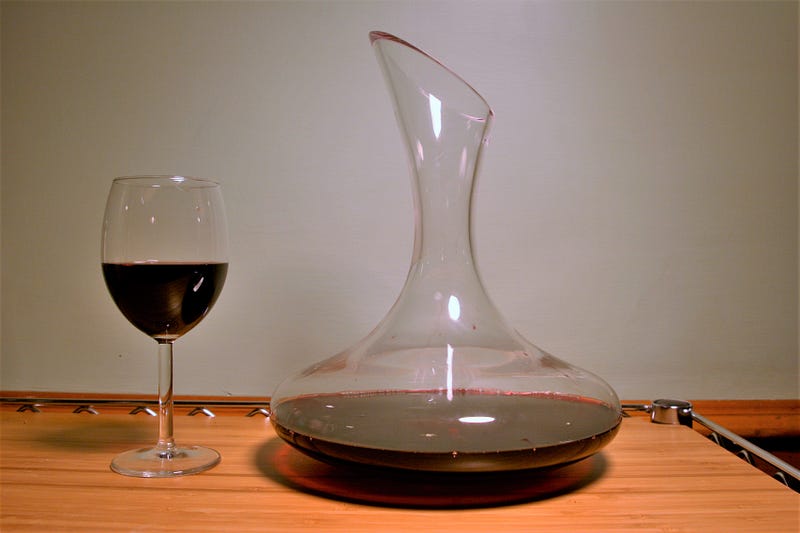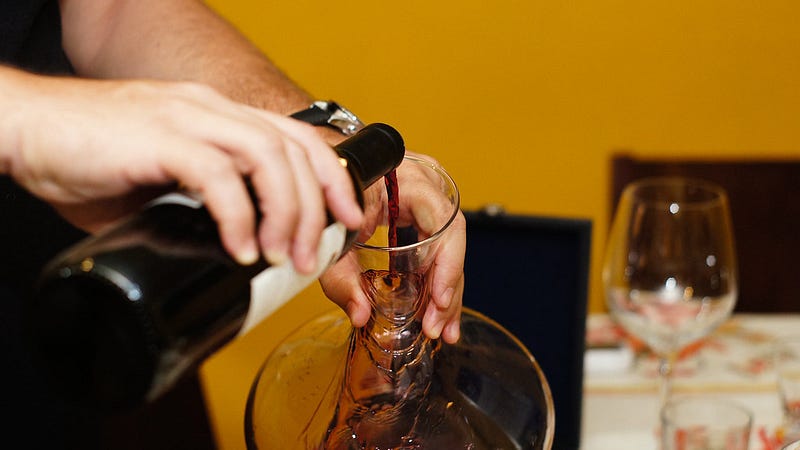The Surprising Benefits of Decanting Red Wine You Should Know
Written on
Chapter 1: Understanding Decanting
Have you ever witnessed someone pour wine into a decanter? Initially, I thought it was just a pretentious act meant to elevate the experience for the affluent.

Image by Geoff Parsons from Portsmouth, VA
For those unfamiliar, decanting involves transferring wine from its bottle into another vessel, allowing it to sit for a period ranging from 10 minutes to 2 hours. The purpose of this is to expose the wine to air, facilitating a process known as oxygenation.
At first glance, the idea of letting wine breathe seems counterintuitive. After all, wine is sealed to keep out oxygen, right? It always baffled me how wine can spoil and turn into vinegar after just a few days of exposure to air. I was definitely skeptical.
However, I was intrigued enough to explore scientific research on the topic. Surprisingly, several studies indicated that decanting can enhance the flavor profile of wine, suggesting that it may indeed offer benefits.
Chapter 2: The Science Behind Astringency
Have you ever taken a sip of red wine only to feel an unpleasant puckering sensation in your mouth? This response is due to astringency.
Astringency isn't a flavor but rather a tactile sensation caused by tannins, which are natural compounds found in grape skins and seeds. While a certain level of tannins is expected, excessive tannins can lead to an unpleasant experience.
Fortunately, decanting can mitigate this issue. By allowing the wine to interact with air, a process called micro-oxygenation occurs. This interaction promotes chemical reactions that reduce astringency.
One significant reaction involves the formation of acetaldehyde, a compound that binds with tannins, causing them to clump together and settle at the bottom of the decanter. This reduces the wine's astringency, resulting in a smoother sip.

Photo by Helena Lopes from Pexels
Chapter 3: Enhancing Aroma
Once a bottle is opened, evaporation begins, releasing volatile compounds from the wine—this phenomenon is referred to as "blowing off." Unfortunately, some of these compounds can impart unpleasant odors reminiscent of rotten eggs or garlic.
Research has shown that decanting for just 10 to 30 minutes can significantly improve the aroma of the wine, allowing more desirable fruity and oaky notes to emerge. Chemical analyses confirmed that decanted wines possess distinctly different characteristics than their non-decanted counterparts, further validating the benefits of this practice.

Image by jdrephotography
Chapter 4: Which Wines to Decant
Decanting is particularly beneficial for younger red wines aged between 3 to 10 years. These wines often contain harsh flavors and astringent tannins that can be softened through decanting.
In contrast, older red wines are typically decanted to separate sediment that accumulates during aging, which can cause a gritty texture and cloudy appearance.
White wines, however, do not typically require decanting. Since they are not aged long enough to develop sediment and contain minimal tannins, they are best enjoyed straight from the bottle.

Image titled “The Wines” by Didriks
In conclusion, I was once quite skeptical about the practice of decanting. I needed solid evidence before I could accept that letting wine "breathe" could have any real impact. However, the accumulating research suggests otherwise.
Next time you open a bottle of red, consider letting it breathe for a bit. You might just be surprised by the difference in taste.